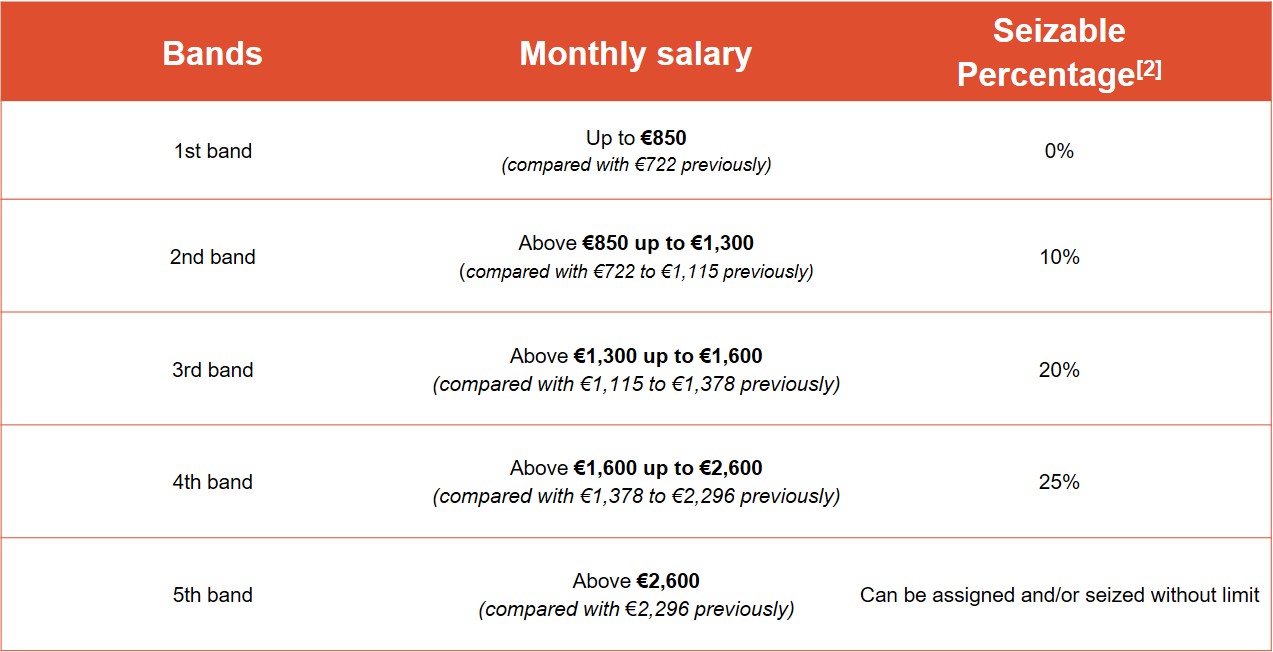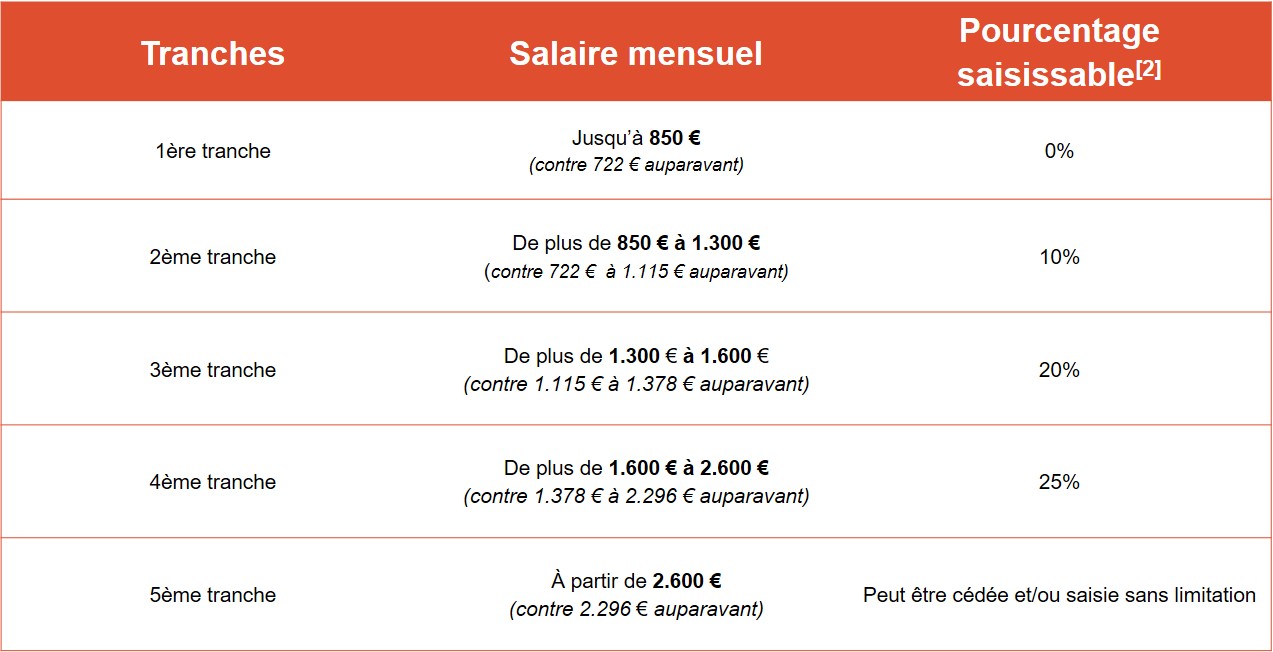Attachments and assignments of wages: new amounts
Following recent index increases, the levels of employee salary bands that can be attached or assigned will increase significantly with effect from 1 April 2023.
Version française ci-dessous | Deutsche Version unten
The mechanisms of attachment and assignment of wages allow creditors to recover amounts owed by an employee by requesting their employer to pay over part of their wages. The Labour Code provides a framework for this practice and stipulates that an employee’s remuneration is divided into five bands, which can only be seized or assigned within certain limits.
After several years without any amendment (the previous one took effect on 1 December 2016), the Grand-Ducal regulation of 1 March 2023 published on 7 March 2023 in Luxembourg Official Journal Mémorial A n°106 of 2023, significantly uprates the salary bands by adapting them to the application rate of the sliding scale of salaries (index 877.01[1]).
The regulation sets out the following revised bands relating to the assignment and attachment of work-related remuneration, together with pensions and annuities:
The new amounts apply from 1 April 2023.
[1] This is the old index that came into effect on 1 April 2022. The legislator has not taken account of the new index applicable from 1 February 2023.
[2] Excluding real estate and maintenance debts.
If you have any questions, please contact our Employment Law, Pensions & Benefits team who will be happy to assist.
Authors: Raphaëlle Carpentier and Gaëlle Leclerc-Aïn
Saisies et cessions sur salaire : nouveaux montants
Suite aux augmentations indiciaires récentes, le montant des tranches de salaire pouvant être saisies ou cédées sera augmenté de manière significative avec effet au 1 avril 2023.
Les mécanismes de la saisie et de la cession sur salaire permettent aux créanciers de recouvrer les montants dus par des salariés en sollicitant de la part de leurs employeurs le versement d’une partie de leurs salaires. Le Code du travail encadre ces pratiques et prévoit que la rémunération d’un salarié est répartie en cinq tranches qui ne peuvent être saisies ou cédées que dans certaines limites.
Après plusieurs années sans adaptation (la dernière remontant au 1er décembre 2016), le règlement Grand-ducal du 1er mars 2023, publié le 7 mars 2023 au Mémorial A n° 106 de 2023, réévalue de manière significative ces tranches en les adaptant à la cote d’application de l’échelle mobile des salaires (indice 877,01[1]).
Ce règlement prévoit dorénavant les tranches suivantes concernant les cessions et saisies des rémunérations de travail ainsi que des pensions et rentes :
Ces nouveaux montants seront applicables dès le 1er avril 2023.
[1] Il s’agit de l’ancien indice entré en vigueur le 1er avril 2022. Le législateur n’a pas tenu compte du nouvel indice applicable au 1er février 2023.
[2] Hors matière immobilière et dettes alimentaires.
Pour toute question, contacter notre équipe Employment Law, Pensions & Benefits qui se fera un plaisir de vous répondre.
Authors: Raphaëlle Carpentier and Gaëlle Leclerc-Aïn
Lohnpfändungen und -abtretungen: neue Beträge
Aufgrund der jüngsten Indexerhöhungen wird der Betrag der Gehaltsabschnitte, die gepfändet oder abgetreten werden können, mit Wirkung zum 1. April 2023 deutlich erhöht.
Mithilfe der Lohnpfändung und -abtretung können Gläubiger die von Arbeitnehmern geschuldeten Beträge eintreiben, indem sie die Arbeitgeber auffordern, einen Teil ihres Lohns zu zahlen. Das Arbeitsgesetzbuch regelt diese Praktiken und sieht vor, dass das Gehalt eines Arbeitnehmers in fünf Tranchen aufgeteilt wird, die nur innerhalb bestimmter Grenzen gepfändet oder abgetreten werden können.
Nach mehreren Jahren ohne Anpassung (die letzte fand am 1. Dezember 2016 statt) werden diese Tranchen durch die großherzogliche Verordnung vom 1. März 2023, die am 7. März 2023 im Mémorial A Nr. 106 von 2023 veröffentlicht wurde, erheblich erhöht, indem sie an den Anwendungswert der gleitenden Lohnskala angepasst werden (Index 877,01[1]).
Diese Verordnung sieht nunmehr folgende Tranchen für die Abtretung und Pfändung von Arbeitsentgelt sowie von Renten und Pensionen vor:
Diese neuen Beträge gelten ab dem 1. April 2023.
[1] Es handelt sich um den vorigen Index, welcher am 1er April 2022 in Kraft trat. Der Gesetzgeber hat den neuen Index, der am 1. Februar 2023 in Kraft trat, nicht berücksichtigt.
[2] Mit Ausnahme von Immobiliensachen und Unterhaltsschulden.
Wenn Sie Fragen haben, wenden Sie sich bitte an unser Employment Law, Pensions & Benefits Team, das Ihnen gerne weiterhilft.
Authors: Raphaëlle Carpentier and Gaëlle Leclerc-Aïn



